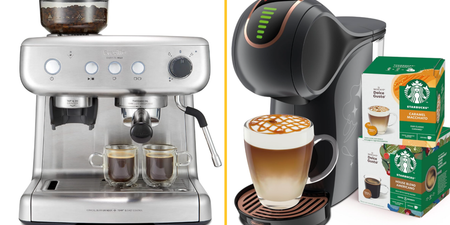At the elite level of rugby, success is defined by the smallest of margins. The right approach to diet, training and lifestyle all make a difference.
As a strength training enthusiast, I’m not one to pass up a workout – not least when an offer comes from England Rugby’s sevens squad – an elite bunch of athletes.
Ahead of the HSBC World Series a little later this summer, England’s players put on a full workout and also provided JOE’s readers with their top tips on nutrition, fitness and maintaining a healthy work-life balance.
Here’s what went down…
The bleep test
Sevens rugby is arguably the most impressive sport on the planet. Though 15-a-side is renowned for its brutal combination of strength and endurance, sevens is a cut above.
While the number of players on each side is reduced by over half, the game is still played on a full-length pitch and those who step out onto the field require lung-busting levels of cardiovascular fitness.
In order to cope with the physical demands, sevens players undergo a series of trials, with the bleep/yo-yo test the pick of the bunch.
As you might remember from school, you’re shuttling between two sets of cones 20-metres apart.
You have to make it to each set of cones before a ‘bleep’ plays. Each bleep is .1 of a level.
Back in the schoolyard, making it to level 14-15 was a deemed a good level of fitness. Thankfully, this is what I hit – but the good news ended after I spoke to team captain Tom Mitchell. To give you an idea of how far the England squad push themselves, Tom said that the guys regularly hit level 22-23 in training.
Strength and conditioning circuits
Rugby blends strength with both aerobic and anaerobic fitness, so it makes sense that the players’ time spent in the gym reflects this.
The guys put us through a strength and conditioning circuit that mirrored the kind of work they’d do after performing their primary compound lifts. This was more in line with my favoured training, but it was still difficult. The key variable is intensity.
You don’t see the England players taking sneaky selfies, or checking their phones in-between sets to see if their Snapchat has gained a response. The brief rest periods add another element to an already tricky circuit.
Below is an example, which also forms the basis of the England routine:
- Pull-ups [30 seconds, as many reps as possible]
- Farmers walk [30 seconds, 20 yards and return, as many laps as possible]
- Prowler pushes [30 seconds, 20 yards and return, as many laps as possible]
- Battle ropes [30 seconds, all out, max intensity]
As a strength and conditioning circuit, this ticks all boxes.
The pull-up is a great show of bodyweight strength that also adds size to your back, biceps and forearms.
Both farmers walks and prowler pushes increase your anaerobic fitness and muscular endurance, with the latter also activating your quads, glutes and hamstrings.
The battle rope finisher beefs up your shoulders and demands a strong level of core stability to generate power.
Take-home tips: diet, training and lifestyle
After our workout, I sat down with Dan Norton, flying winger and the highest try-scorer in the history of Rugby sevens.
He gave a valuable insight into England’s strength training regime:
“Our training revolves around three-to-four compound lifts, such as the bench press, squat and power clean, but their programming can vary.
Some of the lifts may be geared towards building strength and power – with that you lift heavy. Other times we work on muscular endurance – so while the load is lighter, the reps are higher.”
This particular plan demands that you hit a muscle group multiple times from Monday to Friday. Once-per-week bodybuilding plans don’t cut the mustard in a high-octane sport like sevens.
Norton added:
“Our sessions are a mix of upper and lower body sessions performed Monday, Tuesday, Thursday and Friday.
Due to the high volume we hit our muscles with, people always ask ‘why aren’t you massive?’ but they don’t realise we stay lean with the amount of running we do.”
Such a gruelling training regime requires an excellent grasp of nutrition.
“Throughout the week, I primarily eat for performance, with good quality sources of protein and carbohydrates.”
Examples of these that you may wish to include in your diet are turkey and sweet potato. Turkey, for example, is a very lean source of protein rich in leucine, the most potent amino acid.
Sweet potatoes contain gradually-digesting, low-GI carbohydrates and a rich supply of vitamins and fibre.
By following such a strict training and nutrition plan, Norton ensures he gains a psychological break and peace-of-mind by eating some of his favourite foods on the weekend.
“I like pizza in particular, but I try to limit the number of meals I eat out at a restaurant to just one per week.”
While getting to gorge on burgers and pizza may sound like a dream come true, this is generally offset by the amount of energy a sevens player expends during the week.
When it comes to the weekend, the squad are likely playing games, which demands a high-calorie refeed. They aren’t pigging out for the sake of it. You need to earn your cheat meals.
A high-pressure environment such as Rugby sevens involves super stimulation, of ‘psyching-up’ both brain and body to unleash your best on the pitch.
While this is great, it can cloud over the importance of de-stressing, winding down and managing mental health – an overlooked aspect of professional sport.
In that regard, the England guys are forward-thinking – both literally and figuratively.
Norton states:
“A lot of self-talk works well. What helps you individually wind down varies from person-to-person.
A big thing for me is just spending time with the rest of the guys but socially. Even if we’re just chatting rubbish or having banter, it all helps to get rid of stress in-between games! We’ll also watch films too.”
Lessons learned from England rugby’s elite can help you get the most out of your training, nutrition and overall lifestyle habits.
The HSBC World Series sevens tournament is held at Twickenham Stadium on the weekend of June 2nd-3rd, 2018. Click here to buy tickets.













































